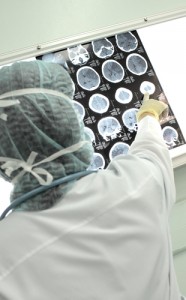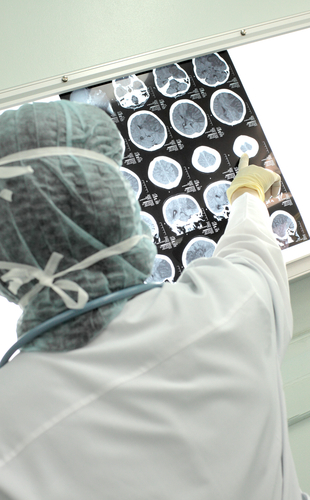 Researchers at the Johns Hopkins Kimmel Cancer Center have successfully prolonged the survival of mice suffering from glioblastoma using two types of immunotherapy together with targeted radiation.
Researchers at the Johns Hopkins Kimmel Cancer Center have successfully prolonged the survival of mice suffering from glioblastoma using two types of immunotherapy together with targeted radiation.
The study, entitled “Focal Radiation Therapy Combined with 4-1BB Activation and CTLA-4 Blockade Yields Long-Term Survival and a Protective Antigen-Specific Memory Response in a Murine Glioma Model” was published in the journal PLoS ONE.
Researchers implanted mice with a glioblastoma cell line, the most common malignant brain tumor in adults, accounting for 52% of all functional tissue brain tumors and 20% of all intracranial tumors, and associated with poor median survival expectancy.
Using a triple therapy regimen consisting of 4-1BB agonist antibodies (a costimulatory receptor expressed on activated T lymphocytes), anti-CTLA-4 blocking antibodies (a receptor expressed on T cells responsible for downregulating the immune system), and focal radiation therapy targeted directly at the tumor using an animal radiation research platform, the investigators followed the mice for survival kinetics.
Both 4-1BB activation and CTLA-4 blockade are therapies targeted at activating the body’s own immune system, enabling anti-cancer drugs to attack the tumor.
The results showed that mice treated with triple therapy had an increased 50% survival when compared with mice receiving only focal radiation or immunotherapy alone, an effect moderated mainly by CD4 T lymphocytes. Furthermore, to understand the capacity of this triple therapy to generate long-term antigenic-specific memory responses, mice that survived glioblastoma and received the treatment were protected against further brain tumors implanted under their skins, suggesting that combination treatment applied to patients could generate some long-term responses.
The data from this study indicates that combining 4-1BB activation and CTLA-4 blockade while administering focal radiation therapy can significantly improve survival in a mouse model of glioblastoma while at the same time generating antigen-specific memory.
Even though these immune therapies are already being developed and used in the clinic, combining them with radiation therapy specifically targeted at the tumor further demonstrates their therapeutic strength when used on hard-to-treat brain tumors.
“We’re trying to find that optimal balance between pushing and pulling the immune system to kill cancer,” said Charles Drake, M.D., Ph.D., an associate professor of oncology, immunology and urology, and medical oncologist at the Johns Hopkins Kimmel Cancer Center, in a Johns Hopkins Medicine press release.
[adrotate group=”1″]
The hypothesis being discussed by the scientists on why triple therapy seems to be more efficient refers to proteins released by tumor cells during radiation treatment that train and induce the immune system to recognize and attack cancer cells, achieving efficient tumor clearance.
“Traditionally, radiation is used as a definitive therapy to directly kill cancer cells. But in this situation we’re using radiation as kind of kindling, to try to induce an immune response,” said Michael Lim, M.D., an associate professor of neurosurgery, oncology at the Johns Hopkins University School of Medicine and member of Johns Hopkins’ Institute of NanoBiotechnology, in the press release.
Currently, the researchers are developing a series of clinical studies to test combination therapies directed at brain tumors. If future research can address the true potential of triple therapy in humans, radiation could be delivered just before or after immunotherapeutic treatment and still achieve positive results, enabling the administration of triple therapy in cancer patients.


